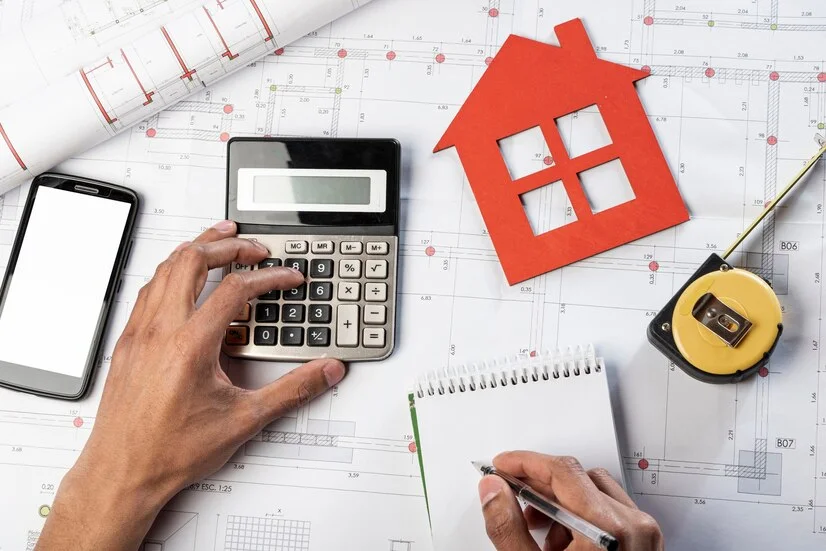Guide To Tax Benefits on a Home Loan For an Under Construction Property

Tax Benefits on a Home Loan for an Under Construction Property, Over the past few years, there has been a multiplication of real estate values. Since the passing of the pandemic, the real estate market has rebounded, making homes nearly unaffordable for the majority of middle-class people. These days, most individuals can only afford homes if they choose to take out a house loan. With house loans, borrowers may purchase the emotional and financial asset that is their ideal home and pay for it in a methodical, trouble-free, and stress-free way. Home loans are the least expensive type of loans since they have extremely low interest rates, according to lenders. Additionally, they can be returned over a 30-year period, which simplifies and lessens the strain of repayment.
A property that is still under construction would be a better investment than one that is ready to move into if you intend to use a home loan to finance your real estate purchase or investment. Under construction properties are initially less expensive. Secondly, you can benefit from Home Loan tax benefits on under-construction property if you invest in such a property. We go into further detail about these tax benefits in this post based on many provisions of the IT Act 1961, such as the capped amount and relevant circumstances.
Sections 24B, 80C, and 80EEA of the Income Tax Act 1961
Here are the IT Act Sections offering under-construction property tax benefits.
IT Act 1961, Section 24B Section 24B of the IT provides an under-construction property tax deduction of up to Rs. 2 lakh each fiscal year. This sum can be subtracted from a home loan's interest rate.
IT Act 1961, Section 80C: Up to Rs. 1.5 lakh in under-construction property tax benefits are provided by Section 80C for each fiscal year. This sum may be deducted from the main balance of your home loan.
IT Act 1961, Section 80EE: The taxpayer is eligible to claim an additional tax deduction of Rs. 50,000 on the interest paid on a house loan after the Section 24B limit has been reached, due to the under-construction property tax advantages of Section 80EE.
IT Act 1961, Section 80EEA: The taxpayer is eligible to deduct an additional Rs. 1,50,000 in taxes from the interest paid on a house loan after the Section 80C limit has been reached, due to the under-construction property tax advantages of Section 80EEA.
Benefits from under-construction property taxes under all of these IT Act sections are subject to specific requirements. To have a thorough understanding of it, read the full post.
Under-Construction Property Tax Benefit As Per IT Act 1961, Section 24B
The Income Tax Act of 1961 states that a taxpayer can deduct up to Rs 2 lakhs for interest paid on a housing loan used to buy a home. Only if the taxpayer physically has and owns the residence throughout the year is the claim on deduction applicable. Section 24 does not permit a tax deduction for property that is still under development. It is only permitted upon the completion of the building and the taxpayer's acquisition of possession.
A taxpayer is only allowed to deduct up to Rs. 2 lakh in interest throughout each financial year. This serves as a combined cap for that year's interest plus one-fifth of the interest during the building phase.
During the pre-construction phase, buyers might choose to merely pay the interest on their loan. After the property is taken into possession, the actual EMI begins. But let's say you have already begun making monthly EMI payments in order to pay back the loan balance over a shorter period of time, even before the project is finished. The principle payments you made on the property while it was still under construction is thus not deductible.
Calculating the pre-construction period for home loan to avail tax benefits
To take advantage of under-construction property tax benefits, you can compute the pre-construction period as follows.
Step 1: Find the start date of your home loan.
Step 2: Find out when the first installment of your house loan was due.
Step 3: Discover the date when the property's construction was finished and you were given possession.
Step 4: Write down the final day of the fiscal year that was right before the date of the purchase of the property or the completion of the construction. This is applicable if you haven't begun repaying your house.
However, the EMI start date will be regarded as the end date of the construction period if you began making repayments prior to either purchasing the home or the completion of its construction.
Step 5: The pre-construction phase lasts from the beginning of the building phase to the end of the house loan.
According to Section 24B, you may claim the whole amount of interest you have paid on your house loan during this time as an under-construction property tax credit. This sum must be divided by five, with each portion being claimed independently in the next fiscal year. You can deduct this interest from your house loan under Section 24B when you file your income tax return for the current fiscal year.
Under-Construction Property Tax Benefit As Per IT Act 1961, Section 80C
The IT Act's Section 80C becomes applicable as soon as the pre-construction phase concludes. This is a result of the fact that you do not make any principle payments on your house loan until the construction is finished.
On the other hand, you are eligible to get an under-construction property tax advantage of up to Rs. 1.5 Lakh every financial year once the pre-construction period expires. These home loan tax benefits will be lost if you sell the property within five years after the last day of the fiscal year in which you took possession.
The tax advantage must be claimed in the same fiscal year that the costs were incurred, under Section 80C of the Income Tax Act.
FAQs
1. What is the highest limiting amount under Section 24B for the under-construction tax benefit?
Answer: Under Section 24B of the IT Act, a taxpayer's maximum tax advantage on under-construction property is Rs. 2 lakh for each fiscal year.
2. How Much of the Section 80C Under-Construction Tax Credit Am I Eligible For?
Answer: Under Section 80C of the IT Act, you are eligible to receive a tax advantage of Rs. 1.5 lakh on under-construction property each financial year.
3. To What Extent Does Section 80EEA Offer Taxpayers a Tax Credit on Property That is Still Under Construction?
Answer: Taxpayers are eligible for an additional tax credit of Rs. 1,50,000 on under-construction under Section 80EEA.
4. Is The Under-Construction Property Tax Advantage Applicable To The Principal Amount of My Paid Home Loan?
Answer: On the principle amount of your paid home loan, you are eligible for an under-construction property tax credit of Rs. 1.5 lakh every financial year. But you can only take advantage of this benefit after you have ownership of the property.
Verify Phone Number
Related Post

A Comprehensive Guide to Home Loan Eligibility for Salaried Individuals in 2024
When purchasing a new home, the costs involved can be quite high, necessitating the need for a home...
Read more...
Top 10 Best Banks for Home Loans
Looking to buy your first home? The process can be thrilling, tiring and a bit scary, especially in...
Read more...
10 Factors To Consider While Choosing Home Loan Balance Transfer
We have different needs and financial requirements in life for which we often apply for loans. Among...
Read more...
Home Loan Balance Transfer: Your Complete Guide to Saving on Interest Rates
Are you feeling the weight of your home loan stretching out over the years? Whether you're already i...
Read more...
Role of Credit History in Home Loan Approval and Interest Rates
A house-buying endeavor requires a significant investment from the lender as well as the buyer. As a...
Read more...
9 Different Types of Home Loans Available in India 2024
Everyone wants to own a home at some point in their lives. Everyone aspires to own a home since it i...
Read more...
10 Tips for First-time Home Buyers in India 2024
Buying a home is not just one of the biggest but also complex decisions in one’s life. This is why i...
Read more...
7 Major Benefits of Closing A Home Loan Early
Lenders have ceased to charge foreclosure fees to clients with house loans that contain variable int...
Read more...
Top 5 Home Loan Benefits for Women in India 2024
For many of us, purchasing a home is an emotional and once-in-a-lifetime choice. We borrow money, sp...
Read more...
Guide To Tax Benefits on a Home Loan For an Under Construction Property
Tax Benefits on a Home Loan for an Under Construction Property, Over the past few years, there...
Read more...Reach out to our Experts if you have any Doubts
Like the best things in life, Consultations @InvestKraft are free
Drop a Mail or give us a Missed Call & Begin your Investment Journey here







